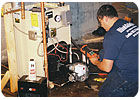
"By and large I decide when and how much I'm going to work as well as who I'm going to work for." Those may sound like words from an independent contractor or an over-the-road truck driver. But those words are from an HVAC contractor - a one-person shop competing in the redwood forest of medium-to-large HVAC contractors in the same community. Steve Scott's comments reflect a need to be able to control one's own destiny without interference "from the top."
The contractor who owns Comfort Technology of Dryden, N.Y., was one of several interviewed by The NEWS for this story about how one-person HVAC shops survive and thrive in today's business climate. Scott said the advantages of being in his position are numerous.
"The advantages to running my own business are almost too many to list," he said. "I control my destiny to a large extent. I make the decision whether we're going to move into a new area, whether it's equipment or a geographical location. I decide how to best present my company to the public at large, and especially to our clients."
How is it possible for the one-person shops to succeed in such a competitive marketplace? A marketplace that sometimes includes multimillion dollar companies?
"I think that being a one-person shop gives me an advantage," said Robert Sweet, owner of Alternative Mechanical Services LLC, Albuquerque N.M. "The advantage is the skill level and experience. Obviously not having the work force to allow me the ability to generate a lot of income is an issue, but along with the large work force comes a lack of skill level and customer rapport.
"Again, it comes back to quality control and what a person's motivation is; for me it's about giving the customer and legacy of the trade what it deserves in skill and ethical business practice. Believe me, I want to make money and lots of it but it is not the driving force. I think that gives me a distinct advantage over a larger company."
But it isn't just being able to succeed by using well-honed skills - being a one-person shop offers a lot of freedom. That's what Wayne Crump, owner of Wayco A/C & Heating Co. Inc., Gaithersburg, Md., said. "I choose to be a one-man shop because of the freedom," he said. "The freedom to choose what kind of work I want to do, the freedom to work for nice people. The freedom to work where I want to work, and not in some bad part of town where my tools can be stolen or I can suffer personal injury.
"I like having the freedom to make my own hours and schedule. When my kids were growing up,
I could always be at their sporting events and school plays. I could coach their soccer teams and make plans for family outings. I didn't have to OK things with an uninterested party whose main interest was to the company."

BEING YOUR OWN BOSS
Setting policy, prices, and hours of operation are just a few of the freedoms of working for oneself. It takes a certain mindset to want to be responsible and liable for everything. Some may label these people as mavericks, while others may refer to them as pioneers or innovators. Given all of the factors that surround the choice of running a one-person business, let's look at some of the everyday challenges and rewards that face one-person HVAC shops - namely being your own boss."I'm on my own because my searches for alternatives have convinced me that, for now, being alone is the best way to provide professional, high quality service to my customers," said Alex Walter, owner of Alex Walter Furnaces, A/C & More, Aurora, Colo.
"All alone I started doing natural gas furnace and split air conditioning system residential service and replacement in 1992 as my 10th career. While working in the business, I looked for someone I could team up with to have a two or more person business. Two times I tried to merge my business with others and in both cases it did not work out. As it turned out, the leaders of the other businesses were unable to successfully manage their business. As a result, both of those are not in business today."
Being able to run a successful business has a lot to do with keeping customers happy, which is true of any size company. But it is especially important to the person who is the boss, tech, installer, and accountant all rolled into one. If a job is not done right, there are no places to hide and no excuses to make. A business has to have a quality image to survive.
"Quality control is probably the No. 1 reason I choose to operate alone," said Sweet. "I'm sure that I am preaching to the choir, but the lack of skilled labor is a real deterrent to taking on additional help. I've seen it from the other side as well, when working for an employer. Most times if offered the assistance of help, I would turn it down. Not because I didn't want to teach someone the trade, rather the help, doesn't want to be taught attitudes; and lack of personal integrity drives me nuts. So I'll do it myself and know it will be done right."

COMPETING WITH THE BIGGER COMPANIES
The old expression of "if you can't beat ‘em, join ‘em" sometimes applies to the one-person shops. While some business owners prefer to remain independent, others choose to keep some ties and an open dialogue with larger competitors."I feel that small and large business can work hand-in-hand in this business if a good rapport and trust is earned, maintained, and allowed to grow," said Kris "Watty" Watson, owner of Watson's Heating Service, Keeseville, N.Y.
"I have one heating and plumbing and one heating and A/C contractor that I trust and have sent them five boiler install referrals in the past few months. In return, I do a good part of their boiler cleanings and tune-ups.
"When they go on vacation their answering service calls me with their service calls, and they do the same for me. It works out great if you can trust the people you are referring."
Walter noted that developing relationships with other contractors is not something that happened overnight. "I refer work to both related businesses (plumbing, electrical, duct cleaning, etc.) inside my geographic area and other HVAC businesses outside my geographic area," he said. "I occasionally get a spiff for doing so or return referrals from them. It works very well but has taken years to develop."
One contractor mentioned he prefers to refer customers to other one-person shops when necessary. "We get many referrals from other one-man businesses that are weak on service," said Scott. "Once we have these clients they usually stay with us. We strive to get and maintain service clients. We cross-reference with a local electrical company and a company that does chimney linings and wood/coal stoves."
But as the word implies, competition does not conjure up images of cooperation. That suits some one-person business owners just fine.
Watson said, "On the cleaning and tune-up end of the business, I am very competitive with the biggest in my area. I take a lot of work from the bigger companies simply because customers get sick of waiting for others to show up, or due to employees that just replace parts instead of finding the problem."
Mike Barnett, owner of Frederick Plumbing Co., Winchester, Va., is flattered to think that larger companies are envious of him. "Some larger business owners are actually jealous because they are less flexible in their ability to choose work, employees, and customers," he said. "Larger companies do not want smaller jobs, so lots of us make a good living from their crumbs."
What may be crumbs to some people are gemstones to others. Take Steve Russell for example. The former business owner of a one-person shop in Oklahoma felt good enough about his work that he'd send price-conscious crumbs to his competition. "You can be extremely competitive and extremely profitable because the people you do work for want you and are willing to pay for your quality and service," he said.
"I rarely had customers shop my price, and even with a very high profit margin they would recommend me to every one in their bridge club, country club, church group, etc. My advertising budget was $300 per year and I had enough work that I could turn away a job if it wasn't lucrative enough for me to do.
"This takes the low-end jobs and gives them to your competitors. It keeps them busy while you make money. If a new customer complained about my price, I could recommend them to a low-baller who would fit their budget. I often ended up going back and fixing the job for a lot more profit than I could have made on the original job.
"I think several of the owners of large businesses looked down their noses at me, but I was not concerned what they thought. I was in business to serve my customers. I made a good living, and just because they had a large, fancy building and a lot of employees did not make them a better company than I was."

PROFESSIONALISM KNOWS NO SIZE
Logic may dictate that because a business employs hundreds of workers and earns millions of dollars, it automatically equates to a more professional organization or image. Not necessarily. In fact, in many cases a one-person shop relies on professionalism to compete and to build a customer base.Billy Miller knows that one-person shops are often judged on the reputations of shady contractors or those who prey on homeowners in order to engage in unethical profiteering.
The owner of Fresh Air HVAC, Corinth, Miss., said, "One misconception about one-man shops is the ‘Bubba' stigma. Not all are Bubba's - and that stereotyping is one that really gets under my skin. I operate with a clean, stocked van, wear uniforms, use the shoe booties, am NATE certified in three disciplines, and a member of the Service Roundtable."
"It is not hard for me to retain and maintain a professional image as I have worked as an officer of Fortune 100 corporations and banks," said Walter. "Actually, my image may be more professional than many larger companies.
"Any one-person shop can have a professional image if their owner is a true professional with all that goes with being one, i.e., ethics, good values, business and personal appearance, standard of living, and education."
Making a positive first impression on customers is a big part of professionalism. Image is not only how a business is run, but also how it is viewed. Image is really how a customer views employees, which is initially comprised of what they look like and how they present themselves.
"Uniforms, name tags, and truck lettering are fairly easy to do," said Scott. "But it is harder for people to present themselves well. Large shops basically have a bunch of employees. Some of these employees have very good working attitudes and some don't.
"We, in essence, put our name on everything we do, so we can present a more consistent, hopefully better, image than a larger company."
Size doesn't matter, according to Russell. As long as a businessperson knows the basics of managing a business and presenting a professional image, it shouldn't matter how many employees a company has.
"Can a one-person shop retain the professional image of a larger company?" he asked. "Not only can they, I feel they must in order to thrive. Image includes neat, well-maintained equipment (including the vehicle being properly identified with signage), uniforms, good personal hygiene, professional business cards (not paper printed on a home computer and cut out by hand), and most importantly, a business-like manner and professional self-image.
"A business owner who knows and acts like a business owner need not apologize for the size of his business."
Russell also touched on a point that many business owners, large or small, fail to grasp - how to run a profitable business. Once again, size is not important for maintaining profitability. "Our country was founded on small business owners providing a service to their community," he said.
"I think some people forget where we have come from as a country, and most forget where they came from as a business owner. No one starts a business at $5 billion in sales and assets! I remember when Microsoft was a small outfit competing against dozens of other small outfits, all working in their home.
"Some companies thrive by growing; others fail by getting too large. The main thing for a company is to know whether they are profitable, have a plan for the future, and follow their plan. My plan was to stay as a self-servicing owner, and it worked for me."

AND FINALLY: THERE ARE SOME DISADVANTAGES
Along with the many positives that one-person business owners talk about there are some negatives, too. Being independent and controlling one's own destiny often comes at a cost. And that price is often too steep for some people to absorb."There are a couple of disadvantages," said Scott. "One is sometimes we get too busy during peak periods. It's much less of a problem since we started offering service agreements, however. Another is keeping motivated. I sometimes have to give myself a mental boot in the butt when I find I'm putting off things I should be working on."
The actual value of a one-person shop can be a disadvantage, too. The prospects of being able to build equity and sell a one-person shop for a good price can be a big deterrent to getting into the business in the first place.
"The biggest disadvantage to the one-person business is lack of survivorship," said Walter. "The one-person business is not really a business, it's a one-person professional practice like a consultant, law or accounting practice. When the one person stops working the business stops.
"The one-person business has very limited sales value as a business. The only real value is in the customer list with additional value in service agreements. From a retirement and estate-planning standpoint, I don't like what I have. I would much rather have a $6 million business with survivorship."
Sweet, who is on his second tour of duty owning a small business (his HVAC business is now 15 years old), said that owning a small business means giving up a lot of personal freedom, too. "The most alluring aspect of being a one-person shop is the freedom to make the decisions that will decide a successful business or a failed business.
"But the Catch-22 is that it is that same freedom that has the potential to wreck this dream of being successful. If something goes wrong, no one is there to bail you out. Or there is not enough money at the end of the month to pay your personal bills. It's all on you."
The lack of being able to fall back on someone else or rely on another person to fill-in is another disadvantage. "I have to do every job," said Watson. "If there is work to be done, I have to be there. I can't just send one of my employees. I have no one to blame a mistake on. If I were to do a boiler or furnace install, I have no one to help me get the old system out and the new system in. I don't have anyone to help hold pipe or ductwork in place while I work.
"I don't have someone to catch a mistake if I should happen to make one."
Crump said that bigger companies get better pricing on equipment, but he thinks it is always possible to turn a disadvantage into an advantage.
"Larger businesses do get better prices," he said. "The only thing I can do is do my best work and give personal service. For example, last week I was in a basement, taking down the old gravity pipes of a boiler system because we were repiping all of the radiators in the house. The husband commented to his wife that now he wouldn't have a place to hang his shirts in the laundry room, since he had been using the radiator pipes.
"I cut a piece of pipe from the scraps and hung it at the end of the laundry room for his shirts without him even asking. It took me all of 15 minutes but it earned me goodwill. It let them know I was there for them, and if I need a referral they are more likely to give it."
But some disadvantages are tough to overcome. John Compton, a contractor from Virginia, decided that running a one-person business was not his cup of tea. So he closed up shop.
"I was a one-man shop and found it didn't work," he said. "I didn't have time to grow the income stream. I needed someone to do the books. I needed a helper on larger systems. Unless you have a group or single large account that needs you only part time but pays for full time, you really can't make it.
"It is all about keeping overhead low and leaves you with a wrench in your hand at the end of the day, not by choice but necessity. Then you go home and do the paperwork. See, a lot of one-person shops are really not. Maybe it is one tech, but Momma or someone does the paperwork. And there are subs.
"I'll bet the one-man shop is a myth. To go it alone and not have any steady income source is not really sound business. There has to be something else. Your income stream is so fragile. There are guys who do it but I think it is a piggyback on an early service retirement or something."

SO WHY DO IT?
Given the fact that there are so many pitfalls to owning a one-person shop, there has to be that certain something that makes the allure of owning a one-person shop too strong to dismiss. Walter made the choice because he didn't want to work for someone else, but he didn't want a lot of people working for him."I don't have to worry about what and how my employees are doing things," he said. "I don't have to incur the expenses (cash and mental) which go with employees, like workers' compensation, unemployment and health insurance, additional liability insurance expense, more vehicles to maintain, more tools to keep track of, etc. In general, as a one-person operation I avoid the feeling that I'm working for my employees.
"As a one-person operation, my communication challenges are kept to a minimum. Since I do the selling and the work, I avoid most all misunderstandings with customers. Because I have a closer relationship with my customers than I would if I had salesmen, I have a better sense of what customers really want. As a result, customers usually get more than they expect - often times much more than they expect."
Scott is more than happy to fight any stigma that one-person shops have undeservedly earned.
"I had an elderly client call me with a no heat call late one Friday evening last February," he said. "She had been a fuel oil customer of the largest company in the area for many years. She was out of fuel. I called the company for her. The customer rep I spoke with explained that she was an on-demand customer, and as such, would have to wait until Monday for fuel!
"We brought temporary electrical heaters to her home to get her through the night. Saturday morning I called a different fuel oil company, one we regularly refer. She had fuel and heat an hour or so later. I'd say instead that there's a stigma for large, impersonal businesses."
And maybe the answer that lies at the foundation of each one-person shop's credo is that there is plenty of work to go around for everyone. The market will support one-person shops. Russell thinks so.
"There are enough customers, and enough different types of customers, to allow us all to prosper," he said. "Even though I don't have any data to support it, my perception is that a very small percentage of people have an HVAC company. The market is huge for routine service and maintenance agreements."
Huge enough for the small guy.
Publication date: 11/20/2006



